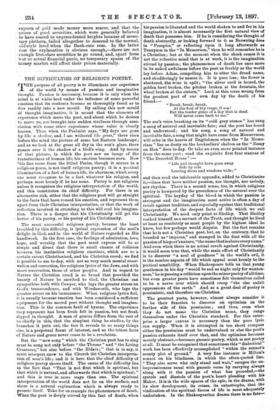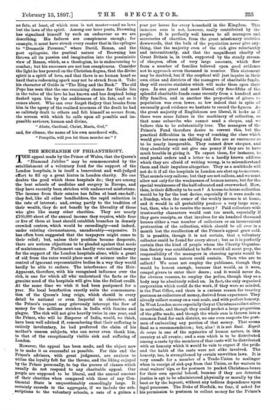THE DIFFICULTIES OF RELIGIOUS POETRY.
THE purpose of all poetry is to illuminate our experience of the world by means of passion and imaginative thought. Passion is necessary, because it is only when the mind is at white heat under the influence of some powerful emotion that its contents become so thoroughly fused as to flow readily into a new mould. By calling this new mould of thought imaginative, it is meant that the elements of experience which move the poet, and about which he desires to move us, are brought into sudden vividness through asso- ciation with some other experience whose value is clearly known. Thus when the Psalmist says, "My days are gone by like a shadow, and I am withered like grass," there rises before the mind the picture of some hot Eastern landscape ; and as we look at the grass all dry in the sun's glare, there passes over it the shadow of a bird's wing. And by means of that picture, in which the poet saw an image of the transitoriness of human life, his emotion becomes ours. Now this fine verse from the 102nd Psalm, though it occurs in a teligious poem, is not itself religions poetry; it is a poetical illumination of a fact of human life, its shortness, which every one must recognise to be a fact, whatever his religion, and
perhaps most keenly if he has none. Poetry is not religious unless it recognises the religious interpretation of the world, and this constitutes its chief difficulty. For there is an alternative risk, either that the religious poet will go straight to the facts that have roused his emotion, and represent them apart from their Christian interpretation, or that the work of reflection involved in attending to this will cool his imagina- tion. There is a danger that his Christianity will get the better of his poetry, or his poetry of his Christianity.
The most successful religious poetry, because the least troubled by this difficulty, is lyrical expression of the soul's delight in God, and in the world of Nature regarded as His handiwork. In the first case, the feelings of admiration, love, hope, and worship that the poet must express will be so simple and direct that there is small chance of collision between his instinctive religious emotions, which are to a certain extent Christianised, and his Christian creed; we find it possible to use to-day, with not so very much mental reser- vation and correction, the religious lyrics of the Jews, and with more reservation, those of other peoples. And in regard to Nature the Christian creed is so broad that provided the beauty of Nature be ascribed to God, the Christian can sympathise both with Cowper, who lays the greater stress on God's transcendence, and with Wordsworth, who lays the greater stress on his immanence. When religions lyrics fail, it is usually because emotion has been considered a sufficient equipment for the sacred poet without thought and imagina- tion. This is the common fault of hymns. The experience they represent has been fresh felt in passion, but not fresh dipped in thought. A man of genius differs from the rest of us chiefly in this, that the simplest thing he studies, by the branches it puts out, the ties it reveals to so many things else, is a perpetual fount of interest, and so the tritest facts of Nature and grace never cease to be a revelation.
But the "new song" which the Christian poet has to sing must be sung not only before "the Throne" and "the Living Creatures," but also before "the Elders " that is to say, it must interpret anew to the Church the Christian interpreta- tion of man's life ; and it is here that the chief difficulty of religious poetry shows itself. The cause of the difficulty lies in the fact that "That is not first which is spiritual, but that which is natural, and afterwards that which is spiritual;" and this is true in more ways than one. The spiritual interpretation of the world does not lie on the surface, and there is a natural explanation which is alWays ready to present itself. Take for an example the phenomenon of death. When the poet is deeply stirred by this fact of death, when his passion is liberated and the world shaken to and fro in his imagination, it is almost necessarily the first natural view of death that possesses him. If he is considering the thought of death abstractly, or looking forward to it as Browning does in " Prospice," or reflecting upon it long afterwards as Tennyson in the "In Memoriam," then he will remember he is a Christian ; but at the moment when the shock comes it is not the reflective mind that is at work, it is the imagination stirred by passion; the phenomenon of death lies once more in its naked awfulness before the poet as freshly as the world lay before Adam, compelling him to utter the dread name, and shudderingly be names it. It is pure loss; the flower is shattered, the wine is spilt; "the silver cord is loosed, the golden bowl broken, the pitcher broken at the fountain, the wheel broken at the cistern." Look at this verse wrung from the greatest poet of our own day by the death of his friend:—
" Break, break, break, At the foot of thy crags, 0 sea!
But the tender grace of a day that is dead
Will never come back to me."
The sea's voice breaking on its "cold grey stones" has sung a song of natural and inevitable fate; and the poet has heard and understood ; and his song, a song of natural and inevitable fate, a song that might have come from Mimnermus, will echo in the hearts of Englishmen when the "In Memo- riam" lies as dusty on the booksellers' shelves as the "Essay on Man" does to-day. Or take an even more pointed instance from the same poet ; read the exquisite first four stanzas of "The Deserted House" :— "Life and thought have gone away Side by side
Leaving doors and windows wide;"
and then read the intolerable appendix, added to Christianise it,—lines that have neither passion, nor thought, nor melody, nor rhythm. There is a second sense, too, in which religious poetry is hampered by the precedence of the natural over the spiritual. The heyday of the blood in which the passion is strongest and the imagination most active is often a day of revolt against tradition, and especially against that traditional interpretation of the deepest facts of life which we call Christianity. We need only point to Shelley. That Shelley ranked himself as a servant of the Truth, and thought he lived at least as resolutely as most people by the highest ideal he knew, but few perhaps would dispute. But the fact remains that he is not a Christian poet, but, on the contrary, that he branded as" impious," and stamped in the dust with all the passion of his poet's nature, "the name that is above every name." And even when there is no actual revolt against Christianity, it would seem true that, while the main effort of Christianity is to discover "a soul of goodness" in the world's evil, it is the sombre aspects of life which appeal most keenly to the poetical sensibility. When Shakespeare tells us that young gentlemen in his day "would be sad as night only for wanton- ness," he is passing a criticism upon the minor poetry of all time; but even greater poets have sometimes felt themselves called to be a nerve over which should creep "the else unfelt oppressions of the earth." And so a great deal of poetry is pessimistic, and therefore un-Christian.
The greatest poets, however, almost always consider it to be their function to discover an optimism on the further side of this pessimism ; and thus, even when they do not name the Christian name, they range themselves under the Christian standard. For this enter- prise a larger canvas is necessary than the pure lyric can supply. When it is attempted in too short compass either the pessimism must be undervalued or else the poet's passion exhausts itself over that, and the optimism becomes merely abstract,—becomes gnomic poetry, which is not poetry at all. It must be recognised that sometimes this "dialectical" work has been effectively accomplished "within the sonnet's scanty plot of ground." A very fine instance is Milton's sonnet on his blindness, in which the often.quoted line, "They also serve who only stand and wait," escapes the un- impressiveness usual with gnomic verse by carrying always along with it the passion of what has preceded,—the systole and diastole of the poet's heart pleading with his Maker. It is in the wide spaces of the epic, in the drama, with its slow development, its crises, its catastrophe, that the vindication of the spiritual forces of life is most adequately undertaken. In the Shakespearian drama there is no fate- no fate, at least, of which man is not master—and no laws but the laws of thespirit. Among our later poets, Browning has signalised himself by such an endeavour as we are describing. His failures are conspicuous enough; for example, it must have struck every reader that in the epilogue to "Dramatiel Personal," where David, Renan, and the poet epiloguise, the poetical nature of Browning has thrown all its passion and imagination into the pessimistic view of Henan, which, as a theologian, he is endeavouring to combat ; but his successes are not less conspicuous. Consider the light he has poured on the Christian dogma, that the divine spirit is a spirit of love, and that there is no human heart so hard that a redeeming spark may not be struck from it. Take his character of Guido in "The Ring and the Book." The old Pope has seen that the one remaining chance for Guido lies in the value of the love be has known and has despised being flashed upon him by the suddenness of his fate, and so it comes about. Who can ever forget theicry that breaks from him in the agony of the realised nearness of the death he had so callously dealt to others and felt himself so secure from, the scream with which he calls upon all possible and im- possible saviours, human and divine, "Abate, Cardinal, Christ, Maria, God," and, for climax, the name of his own murdered wife, "Pompilia, will you let them murder me " ?



































 Previous page
Previous page